Last update:
Biology news

How macronucleophagy ensures survival in nitrogen-starved yeast
Autophagy, the cell's essential housekeeping process, involves degrading and recycling damaged organelles, proteins, and other components to prevent clutter. This vital mechanism, found in all life forms from single-celled ...
Cell & Microbiology
7 hours ago
0
12

Why do birds make so many different sounds? A study gets at the underlying factors
Birds make sounds to communicate, whether to find a potential mate, ward off predators, or just sing for pleasure.
Plants & Animals
7 hours ago
0
31
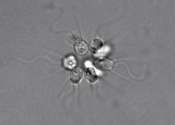
Tiny microbe colonies may use electrical signaling to coordinate their behavior
A new study published in Science Advances reveals evidence of electrical signaling and coordinated behavior in choanoflagellates, the closest living relatives of animals. This elaborate example of cell communication offers ...
Evolution
8 hours ago
0
41
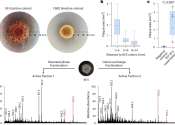
Killing the competition: Bacteria produce molecules that help viruses infect their rivals
In a new study, researchers at Indiana University Bloomington have discovered a new way that bacteria can kill its competitors in complex microbial communities, revealing novel approaches to leverage viruses to kill harmful ...
Ecology
8 hours ago
0
31

Toxin-antitoxin systems could target invasive and resistant bacteria
In a counterintuitive move, bacteria are known to produce self-destructive toxins. However, they also make antitoxins, and researchers at Lawrence Livermore National Laboratory (LLNL) have identified these toxin-antitoxin ...
Cell & Microbiology
8 hours ago
0
35

Blueberry industry at risk as powdery mildew spreads worldwide
A new North Carolina State University study pinpoints the worldwide spread of a fungus that taints blueberry plants with powdery mildew, a disease that reduces blueberry yield and encourages the use of fungicides to combat ...
Plants & Animals
9 hours ago
0
1

Scientists unravel how ancient bacteria weave living mats—solving one of nature's oldest mysteries
Scientists have uncovered how cyanobacteria—Earth's first photosynthetic organisms—self-organize into intricate living mats, offering insights into aquatic ecosystems and potential inspiration for material design.
Cell & Microbiology
9 hours ago
0
6
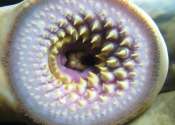
Scorching climate drove lampreys apart during Cretaceous period, DNA and fossil record reveal
A new study finds that one of the hottest periods in Earth's history may have driven lampreys apart—genetically speaking. The work could have implications for how aquatic species respond to our current changing climate. ...
Evolution
10 hours ago
0
104

Scientists create scalable solution for analyzing single-cell data
Researchers have amassed vast single-cell gene expression databases to understand how the smallest details impact human biology. However, current analysis methods struggle with the large volume of data and, as a result, produce ...
Cell & Microbiology
9 hours ago
0
0
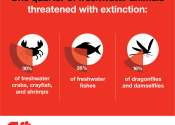
A quarter of freshwater species face extinction: Study
A quarter of freshwater animals, including fish, insects and crustaceans, are at high risk of extinction due to threats including pollution, dams and farming, according to a new study published on Wednesday.
Ecology
10 hours ago
0
7

Scientists leverage AI to fast-track methane mitigation strategies in animal agriculture
A new study from USDA's Agricultural Research Service (ARS) and Iowa State University (ISU) reveals that generative Artificial Intelligence (AI) can help expedite the search for solutions to reduce enteric methane emissions ...
Biotechnology
10 hours ago
0
2

Engineered bacteria break down microplastics in wastewater
Microplastics can go right through wastewater treatment plants, and researchers have engineered bacteria commonly found there to break down this pollution before it can persist in the environment.
Cell & Microbiology
10 hours ago
0
15
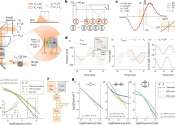
Optical tweezer technique reveals novel disease indicators in aging animals
A new method based on optical tweezers can measure viscoelasticity of biological materials in a simpler and more versatile way. In an article published in Nature Nanotechnology, the researchers report three novel results ...
Biotechnology
10 hours ago
0
36

Computational biologists develop AI that predicts inner workings of cells
Using a new artificial intelligence method, researchers at Columbia University Vagelos College of Physicians and Surgeons can accurately predict the activity of genes within any human cell, essentially revealing the cell's ...
Cell & Microbiology
12 hours ago
0
17

Discovery of 'Punk' and 'Emo' fossils challenges our understanding of ancient mollusks
Researchers have unearthed two fossils, named Punk and Emo, revealing that ancient mollusks were more complex and adaptable than previously known.
Evolution
12 hours ago
0
49
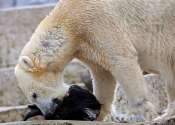
Rethinking population management in zoos: New policy suggests natural reproduction and culling
Until now, contraception has been the method of choice for zoos to avoid surplus animals. Researchers are now calling for a paradigm shift: zoos could preserve their breeding populations, raise awareness of conservation challenges ...
Plants & Animals
12 hours ago
0
22

Just 7% of male humpback whales in New Caledonia may have fathered offspring
A small international team of marine mammal scientists has found evidence that just 7% of the male humpback whales residing near New Caledonia, in the southwest Pacific, may have fathered offspring. For their project, reported ...
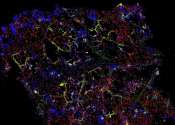
Plant cells gain immune capabilities when it's time to fight disease, scientists discover
Human bodies defend themselves using a diverse population of immune cells that circulate from one organ to another, responding to everything from cuts to colds to cancer. But plants don't have this luxury.
Plants & Animals
12 hours ago
0
2

Herbivore or carnivore? A new toolbox for the study of extinct reptiles
Evolution has resulted in the development of both herbivores and carnivores—but how? What type of food did extinct vertebrates eat? And how can we gain insight into the diets of these creatures? In living animals, we can ...
Plants & Animals
12 hours ago
0
17

Ants hold grudges, study suggests
A team of evolutionary biologists has demonstrated that ants learn from experience. Led by Dr. Volker Nehring, research associate in the Evolutionary Biology and Animal Ecology group at the University of Freiburg, and doctoral ...
Plants & Animals
14 hours ago
0
73
More news

Blue mussels in the Skagerrak more diverse than previously thought

Uncovering clues to a natural gene-editing technique

New explorations of wheat stem sawfly management

Crop switching for climate change in China

New orchid found on Australian island resembles a cupcake

Invasive tilapia species threaten Gulf of Carpentaria ecosystems

Findings may help researchers develop a medication-friendly grapefruit
Other news

Dormancy: Life's first survival strategy?

Debris falling from the sky: More often, more risk

19 times a day: Male medaka mating limits revealed

















































